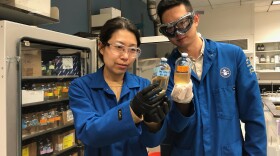-
Called Solar For All, it allocated $56 million in grant money for solar panel construction to bring down energy prices for low-income Idahoans.
-
Last Monday, the Nez Perce Tribe, home of the Nimiipuu, received a $37 million grant from the U.S. Environmental Protection Agency to cut climate pollution and improve air quality.
-
The Biden administration is unveiling new, stricter pollution standards for American cities such as Salt Lake City, Utah, which have long struggled with chronically dirty air.
-
A construction company will have to pay to restore a river near Pocatello after it failed to comply with federal environmental protection requirements.
-
The head of the Environmental Protection Agency defended a proposal to limit power plant emissions in a recent visit to Wyoming.
-
There’s a lot of concern about PFAS chemicals that have seeped into waterways in the Mountain West. But some researchers are finding that bacteria can help clean them up.
-
A new study shows that toxic chemicals are leaking from oil and gas wells that aren’t even operating, raising concerns about the millions of abandoned wells scattered across the country.
-
The U.S. Supreme Court recently sided with a couple battling federal officials over plans to build a house on a wetland in northern Idaho. Some call the ruling a victory for property rights, but its consequences extend to wetlands and waterways nationwide.
-
Water conditions are improving in Lake Cascade after an early season algae bloom turned much of the lake green before the July 4th holiday.
-
Abandoned uranium mines are found in all corners of the Southwest. With big money flowing in the coming decade from settlements with large corporations and the U.S. government for contamination, cleanup of hundreds of abandoned mines will finally begin after decades of neglect. And that means jobs for tribal citizens and businesses, providing an economic balm for areas that need work.

Play Live Radio
Next Up:
0:00
0:00
Available On Air Stations










